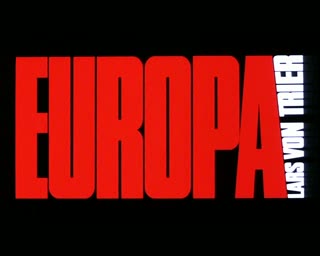Réalisation:
Lars von TrierMusique:
Joachim HolbekActeurs·trices:
Jean-Marc Barr, Barbara Sukowa, Udo Kier, Ernst-Hugo Järegård, Erik Mørk, Jørgen Reenberg, Henning Jensen, Eddie Constantine (plus)Résumés(1)
Octobre 1945. Américain d'origine allemande, Léopold Kessler dont les parents ont fui le nazisme, découvre l'Allemagne détruite et divisée de l'immediat après-guerre. Il a décidé de se rendre en Europe par idéalisme, pour contribuer à la reconstruction du vieux continent. A Francfort, son oncle, employé de la compagnie ferroviaire Zentropa qui reprend progressivement ses activités l'accueille et lui offre un emploi semblable au sien: conducteur de wagons-lits. (Les Films du Losange)
(plus)Critiques (4)
Trier's fascination with the surface may manifest itself unhealthily in this film, yet the processing of the deliberately clichéd and archaic romance got to me completely - a deep film regression into post-war Germany serves Trier primarily as a disillusioning metaphor for the destruction of human ideas and their constant abuse and butchery. Dirty, rusty and dilapidated scenery (often even theatrically exaggerated and deliberately styled to reveal its illusiveness) hosts Trier's withdrawn, yet extremely intense characters. Their confused efforts are covered by a captivating canvas, on which one again and again encounters the overwhelming force of history, rushing like a train along the tracks to the next point zero. Europe is a hypnotic film that uniquely captivated me with more so with its stylization than depth of thought. However, this does not detract whatsoever from its hideous beauty.
()
The viewer's experience is somewhat spoiled by the fact that this is the imaginary climax of a trilogy whose first two parts were not released in the Czech Republic. I’m therefore reviewing this separately from them. Given the subject matter, I often thought of Holland's Europa Europa, during the screening, which is quite logical. Von Trier's formal exhibitionism here brings the combination of black and white and color film into the gears of the plot, the claustrophobic setting of the train compartments, so symbolic of the Holocaust, as if the schizophrenia of the first months after April 1945, viewed through the lens of a slightly naive American, were not enough. A challenging emotional film with a slightly surprising denouement.
()
Lars von Trier is simply a great filmmaker. There can be little doubt about that. He has great ideas, which are also evident in the film "Europe". His post-war approach to Germany is immensely interesting and original. The narrator's voice, if we can even call it that, is great as it clearly determines how the story will unfold. The countdown is simply brilliant. However, the film was unable to captivate me enough to say that it is a great work overall.
()
Instead of an explicit look at the war as such, Lars von Trier has opted for a more social/psychological film, in which he captures the hopelessness of the post-war situation in Germany very well. While the main story is undoubtedly suspenseful and even gripping in some moments, it is also interesting to see how the war and its consequences are seen by supporting characters (especially in the area of interpersonal relationships). It's certainly not Lars' best work, but the excellent visuals, some of the stronger moments, and the immersive effect in the narrative interludes give it an indelible place in Trier's filmography.
()

